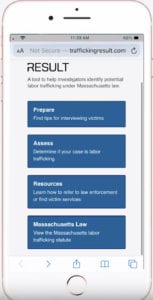Who is a member?
Our members are the local governments of Massachusetts and their elected and appointed leadership.
 In a joint effort to combat labor trafficking in Massachusetts, Attorney General Maura Healey, faculty from the Boston University School of Law, and representatives from the BU Spark! Initiative at BU’s Hariri Institute for Computing on Oct. 24 announced a new tool they developed to help identify potential labor trafficking cases and connect victims to resources.
In a joint effort to combat labor trafficking in Massachusetts, Attorney General Maura Healey, faculty from the Boston University School of Law, and representatives from the BU Spark! Initiative at BU’s Hariri Institute for Computing on Oct. 24 announced a new tool they developed to help identify potential labor trafficking cases and connect victims to resources.
The RESULT (Recognize and Evaluate Signs to Uncover Labor Trafficking) web-based app, which can be found at www.traffickingresult.com, assists investigators in understanding and uncovering signs of potential labor trafficking and allows them to refer victims to resources and to law enforcement officials who handle labor trafficking investigations and prosecutions.
The goal of the app is to increase the number of referrals for suspected instances of labor trafficking. Since forced labor scenarios are often imbedded within legitimate commercial enterprises and within private homes, labor trafficking and the victims impacted can be difficult to identify.
“Labor trafficking is happening in communities and across industries in our state, but it’s often hard to identify and significantly underreported,” Healey said in a prepared statement. “This new tool will help identify labor trafficking, bring it to the attention of law enforcement, and provide quick access to victim resources. With more eyes and ears, we can shed light on this exploitation, bring traffickers to justice, and protect and assist survivors.”
The Attorney General’s Office will hold a webinar Nov. 19 for municipal officials on labor trafficking that will include information on how to use the RESULT app.
The RESULT app is designed to be a resource to state and local inspectors, compliance officers, first responders, investigators and law enforcement. The online tool provides users with tips about interviewing victims, an assessment tool tailored to state law, and detailed information about victim resources and protections available in Massachusetts.
The RESULT app asks a series of questions relating to likely indicators of labor trafficking – including serious harm, physical restraint, abuse of the law, withholding identity documents, extortion, and financial harm – to help determine if the user is dealing with a potential case of labor trafficking. Under Massachusetts law, an employer who engages in any one of these behaviors to obtain or maintain someone’s services may be participating in labor trafficking. The app provides information to refer observations to the National Human Trafficking Resource Center and the Massachusetts Attorney General’s Office.
The app also provides guidance to law enforcement officials for interviewing victims, such as how to develop trust, how to gain an understanding of the victim’s background, and how to interact with them safely. It allows users to connect victims with food, safety, shelter and legal resources and provide information about important protections for victims under state and federal law.
An explainer on the RESULT app and a short digital tutorial on how to use and navigate it will be included in all future labor trafficking trainings and events held by the AG’s Office throughout the state, including for municipal building inspectors, law enforcement and service providers.
In 2011, the state Legislature passed An Act Relative to the Commercial Exploitation of People, which created the crimes of trafficking in persons for forced services and for sexual servitude. “Forced services” are services performed or provided by a person that are obtained or maintained by another person who engages in conduct that essentially compels a person to work, either through threats, harm, restraint, confiscation or destruction of one’s passport or other immigration document, extortion or causing financial harm. Penalties for violations of this law include imprisonment of not less than five years and a fine of not more than $25,000. Businesses found guilty of forced services can be fined up to $1 million.